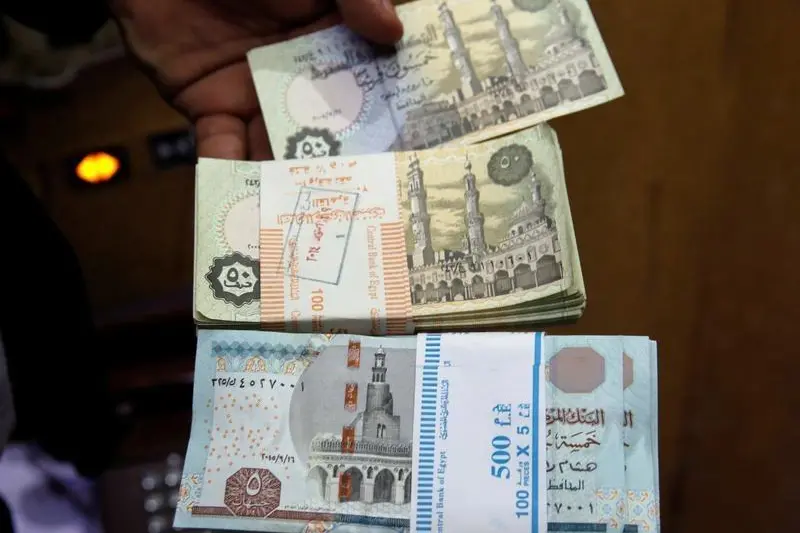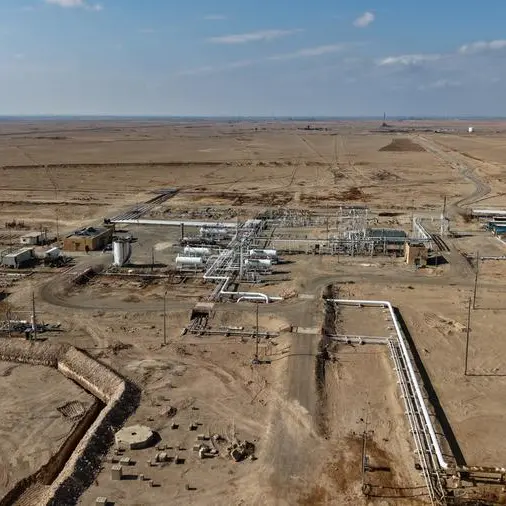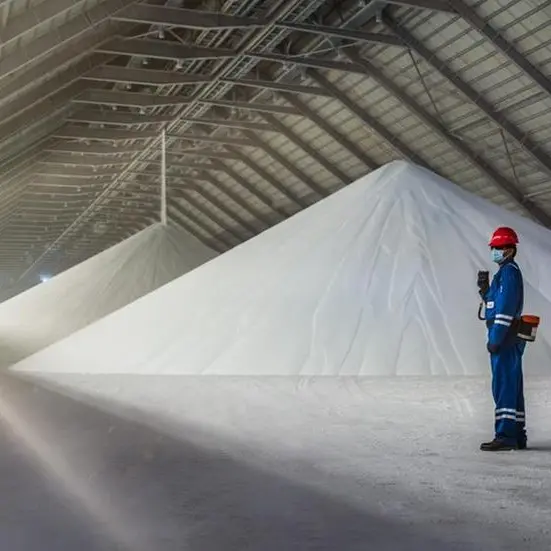PHOTO
From the shelves of family-owned, neighborhood storefronts and the tables of Cairo’s sidewalk vendors to the Metro cars where roaming salespeople ply their wares, the “Made in China” label is as ubiquitous in the Egyptian capital as traffic and steaming cups of tea. But as the U.S. dollar, the standard global currency, has become harder for traders to get their hands on, imports of all kinds have been affected. When they are able to secure dollars, importers have to roll the dice and hope that they don’t lose too much as a result of buying and selling in three different currencies. “We are never really sure how much yuan we will end up with when we arrive,” says Ahmed Fahmy, who sells affordable Chinese-made men’s suits at a downtown shop. In the past 18 months, Fahmy estimates that he’s lost LE 50,000 thanks to the volatile exchange rates.
Two pieces of recent news could reduce the number of times traders like him have to change currencies as well as bolstering Egypt’s economic ties with China. On Oct. 1, the International Monetary Fund added the Chinese yuan to its basket of reserve currencies known as Special Drawing Rights, or SDRs, an imaginary currency that tracks the value of a handful of global currencies including the U.S. dollar, the euro, the Japanese yen and the British pound. While analysts noted that the move is largely symbolic, it recognizes China’s growing importance in the world economy and the Asian giant’s recent efforts to “internationalize” the renminbi, or “the people’s currency,” as it’s officially called. A few weeks later, an unnamed official at the Central Bank of Egypt told Bloomberg that Chinese authorities were reviewing a $2.7 billion currency-swap deal between Egypt and China. Under such a swap, say analysts, the CBE would furnish Egyptian banks with yuan to pay for imports from China, one of Egypt’s biggest trade partners. It would amount to “an extra tool to stabilize the current high USD demand, in addition to more FX liquidity at a reasonable cost,” wrote Pharos Holding in a recent note to clients. Furthermore, International Cooperation Minister Sahar Nasr also told the state-run MENA news agency that Egypt is in talks with China about a $4-billion loan, $1 billion of which would be used to support foreign reserves, with $3 billion allocated to development. Deputy Finance Minister for the Treasury Mohamed Meait said Egypt would begin negotiating a $2-billion loan from China in November.
Egypt, with its enormous population of low-income city dwellers, has become an increasingly lucrative destination for cheap, Chinese-made goods, despite sporadic efforts by the government to crack down on smuggled, low-quality imports. The flood of Asian knick-knacks has persisted despite protectionist measures meant to support local industry. In 2015, then trade minister Mounir Fakhry Abdel Nour announced a ban on Chinese-made Ramadan lanterns, plastic sphinxes and other Egypt-themed souvenirs, though there is no evidence that the decree was ever enforced.
Analysts believe a currency swap with China could boost trade and investment from the Asian giant, which is already among Egypt’s biggest trade partners. In fiscal 2015/16, trade with China totaled $5.19 billion, according to the CBE. The balance is skewed dramatically in China’s favor, with Egypt importing $4.73 billion worth of Chinese-made electronics, clothing, automobiles, toys and other goods during the last financial year while exporting just $460 million worth of crude oil and gas, marble and granite, lubricant, oranges and raw iron to China. And those figures don’t take into account the massive amount of Chinese-made goods that are smuggled into Egypt.
Currency swaps are often used to hedge against dramatic currency fluctuations and by countries with liquidity problems. The proposed swap would enable local importers of Chinese products to access yuans directly, without buying dollars—which have tripled in price over the last five years on the black market, which, until early last month, was the only option for the vast majority of Egyptian businesses and traders needing hard currency. At the beginning of the swap, the CBE buys a certain amount of yuan with Egyptian pounds at the going market exchange rate and vice versa. At the end of a fixed term, the two countries pay each other back, with interest. In the meantime, the money can be used for trade, investment or to fortify Egypt’s foreign reserves, but it cannot be converted into another currency. The swap has the potential to benefit both countries, say analysts. “For China, providing trading partners with yuan currency swaps has been another move on the road to expand, albeit gradually, the use of the renminbi on the international arena,” wrote Pharos in its research note. “For Egypt, it marks an opportunity to support the CBE’s FCY reserves whilst slightly ease local demand for the USD.” It concluded: “We believe that acquiring a yuan currency swap provides the CBE with an extra tool to stabilize the current high USD demand, in addition to more FX liquidity at a reasonable cost.”
It also makes sense from a longer-term perspective for Egypt to bolster its economic ties with China. As the Asian nation has grown into a global manufacturing powerhouse, the world’s biggest exporter, its currency—which the government has traditionally kept tightly controlled—has remained largely local, little used for international trade. Now that is changing, however; analysts agree that joining the basket of SDR currencies illustrates the renminbi’s growing stature as a global currency, as more nations are using yuans. Recent data from the Society for Worldwide Interbank Financial Telecommunication in Brussels indicates that 101 countries, most in Asia and sub-Saharan Africa, use the renminbi for at least some of their trade with China. The yuan’s advance into the international market demonstrates President Xi Jinping’s goal of challenging the hegemony of the dollar and a global economic order that has traditionally been dominated by the United States and Europe.
Sure enough, analysts note the renminbi’s growing popularity as an alternative trade currency, having spread from China's core trade partners to smaller nations, particularly in emerging markets. The list includes India, Zimbabwe, Angola, South Africa, Ghana and Mauritius as well as the African economic powerhouse Nigeria, where the yuan comprises some 10 percent of the country’s foreign reserves. “This could be an early signal that emerging markets are increasingly adopting [the yuan] as a trade currency in preference to the dollar,” said Helena Huang, China economist at London’s ICBC Standard Bank, talking to The China Daily late October. A 2016 HSBC report predicts that by 2020, the yuan will be used in half of China’s international trade, compared to around 20 percent currently.
The currency swap should make it easier for Chinese investors to set up shop in Egypt, a key goal as Cairo has been courting Chinese companies to invest in planned megaprojects like the Suez Canal Economic Zone and the so-called administrative capital. According to an August report by the Egyptian Businessmen’s Association, there are more than 1,200 Chinese companies doing business in Egypt with investments totaling $500 million. “Having CN¥ 20 billion in the local banks will massively benefit Chinese companies wanting to import supplies from their headquarters in China,” says Fadel Yacoub, an economics professor at Ain Shams University.
However, there are serious risks associated with what is “similar to a commercial loan with the pound acting as a collateral,” writes Hany Genena, head of research and head of equities strategy at Beltone Securities, in a message. Ihab el Desouky, head of the economics department at Sadat Academy for Management Sciences, worries about how Egypt will pay back the currency loan, noting that Egypt’s exports to China amount to just one-tenth of its imports. The currency swap would only likely exaggerate this deficit “as it becomes even easier to buy things from China,” says Ahmed Adam, a former head of research at the local arm of the National Bank of Abu Dhabi.
However, the wind appears to be blowing in Egypt’s favor, currency-wise. While the dollar has surged against other currencies following the presidential elections in the United States, the renminbi’s value has been falling steadily since January 2014. The yuan dipped to its lowest level against the U.S. dollar in more than eight years in late November. Many analysts have predicted that the yuan will keep dropping against the dollar in the coming years, which would bode well for Egypt in a currency swap. In trade talks in Washington, D.C. late last month, Chinese deputy trade representative Zhang Xiangchen disputed charges from some that China is deliberately keeping the yuan artificially low to boost exports as its growth has slowed. Many economists also agree that China no longer manipulates its currency.
In any case, Adam is skeptical that a currency swap with China would have any significant effect on helping to reverse Egypt’s ongoing foreign currency shortage, given that China, big as it is, only accounts for 7 percent of Egypt’s total trade. “To secure basic goods such as wheat, sugar and other commodities, we still have to rely on the rest of the world, which deals in dollars,” says Adam. Gala Abdel Gawad, former head of the Central Bank of Egypt’s foreign-currency management division, says, “A swap doesn’t really do anything to address the dollar deficit, and now it will be more complicated, as the government needs to secure both dollars and yuan.
But Raafat el Shabrawy, an international trade professor in Menofia University, says that the currency swap is a no-brainer given both Egypt’s dollar shortage and the growing international profile of the yuan. “On a most basic level, Egypt needs to have a sufficient currency supply from all internationally recognized currencies,” says Shabrawy. “We have always had a limited supply of yuan in our treasury; hence, the swap was a must.”
Ultimately, diversifying the currencies that can be used for international trade could reduce Egypt’s longtime dependence on the U.S. dollar—a situation that can lead to drastic consequences that have become all too clear recently. Magd el-Din el Manzalawy, deputy head of the Engineering Export Council and head of the taxation committee at the Federation of Egyptian Industries, believes that, in the long run, a Chinese currency swap could ultimately help stabilize the value of the Egyptian pound following the Central Bank’s recent currency float. “Diversification is a must to prevent panic attacks on one currency,” he says.
© Business Monthly 2017





















